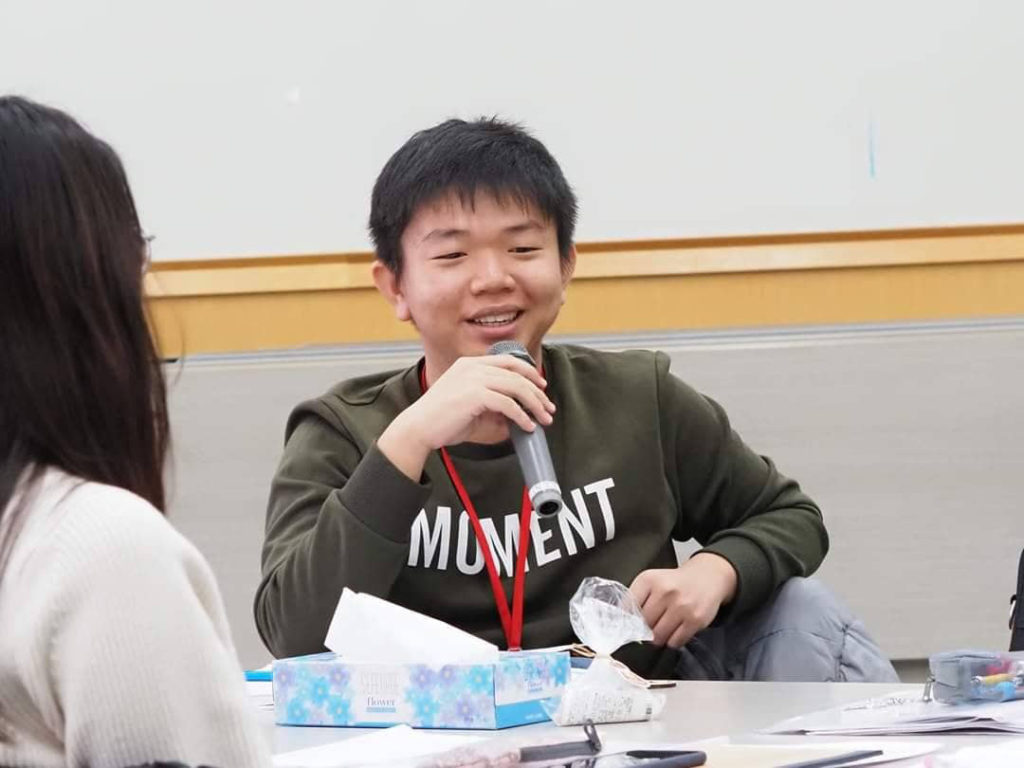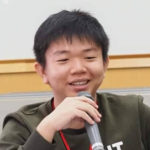“I believe technology plays a huge role in solving many world issues”
Hoon Fan Jing
High School student
Malaysia
Since the Covid-19 pandemic, the world has been disrupted at an unprecedented rate and scale. Schools have closed, economic activities have slowed down, the unemployment rate surged, virtual events have replaced face-to-face interactions, lockdowns have caused financial and emotional burden, these are just a few from the list of how the pandemic impacted our life. The year 2020, plagued by the pandemic, will not end covid-free and people will still live in the new normal in the coming years. In this context, I will depict the world’s possible challenges as well as the world I envisioned.
During the pandemic, spiking infection cases forced governments to shut down their economy which plunged the demand for goods and cast uncertainties on investors. Increasing numbers of countries are leaning towards nationalism which they prioritize the nation’s interest to alleviate the country’s heightening unemployment rate and to secure precious resources for containing the disease. As a result, worries of inadequate international collaboration are triggered as some fear underdeveloped countries and underprivileged individuals might not get the help needed which includes vaccine distribution and financial aid. If inadequate help is given, the disparities may be amplified.
A weakened economy has resulted in ripple effects across society. Poverty undermines one’s well-being and ending poverty has been one of the focuses on sustainable development. The underprivileged are more vulnerable to the slowing economy as work-from-home is not a feasible choice for them. The increasing demand for food bank programs highlighted a concern about the hunger problem. Malnutrition and discontinuing school may be faced by more children in some areas which worsens the poverty issue. Even when the economy recovers after Covid-19, the poor may be less benefitted by the recovery, hence effort is needed to bridge the gap between wealth disparity.
The vaccine is regarded to be a crucial solution in ending the pandemic. Yet, vaccine hesitancy, the reluctance to be vaccinated, are fueled by the spread of unfactual news and conspiracy theories on the Internet. This created distrust of the people towards science that harms the creation of herd immunity which protects people from the disease.
The world faces more underlying challenges than what I mentioned, yet the problems above are what I think worth solving.
The ideal society to navigate the world from the adversity caused by the pandemic is a society that values international cooperation. In the short term, prioritizing own country’s interest is needed to boost social and economic development but when considering a long-term impact, globalization makes countries interconnected and any instability or social unrest may cause chains of events across borders. Take disease control as an example, if an underdeveloped country failed to recover from the pandemic and has its health care system crumbled, an outbreak such as Ebola or Covid-19 may again put the world in danger. Vaccine distribution programs such as Covax, monetary aids, humanitarian help, etc are a good start to give meaningful assistance to some countries, but a more close-knitted relationship between countries to come up with plans to weather through future pandemics are necessary.
In my imagination of a post-pandemic world, institutions and universities around the world will come together and form an alliance capable of discovering disease and providing cure proactively. As information and expertise are easier to exchange among experts and governments, the world will gain an advantage in hunting down the next infectious disease. Having vaccines available in a year is remarkable, but in the future, I believe the time span for vaccine development will decrease drastically when quantum computing technology, which has the potential to better simulate molecular interactions, is mature enough to be utilized. This will make humans more versatile when facing future diseases.
Border closure is meant to control the risk of importing Covid-19 cases, yet a global id may help countries to open up. The global id is a database for the testing and vaccination of an individual. After getting tested for Covid-19 or being vaccinated, the data can be uploaded to the global id, giving countries more confidence to allow traveling. When the confidence is built up, business and tourism will soon start to revive. Other than business and tourism, cinemas, restaurants, pubs, large social events, etc may also face fewer restrictions.
Besides, I imagine that in the future, a portable testing device may be possible. Only a small device is needed to test a person’s blood sugar level and I believe, although it is a bit of science fiction, the same can be done on Covid-19 testing. Smartphones integrated the functions of the camera, computer, telephone, and other devices into a thin device. As electronics technologies advance and more sophisticated components can work in small gadgets, the portable testing device may help to roll out large-scale testing in which the government can grasp a more accurate picture of the spread and implement effective policies that deal the least harm to the economy. In fact, a credit card-sized testing device is being developed by Stanford University (1). Moreover, if it can be updated just as smartphones have their software updates or application downloads, it can be a game-changer in the medical field. Although it is just my imagination, I am eager to see the device to be materialized.
How would I want to contribute to such changes I imagined? I wanted to be an engineer who works on advanced technology. I believe technology plays a huge role in solving many world issues. Besides, I will continue to update myself on Covid-19 related news so that I can share accurate information with people around me so that we can better protect ourselves. In March during the lockdown, I made a video about Covid-19 to participate in a competition as well as to spread information about the disease. I will attach a link below, feel free to watch! (2)
It has been a hard time for everyone. When I was having a good time in TYCA in December of 2019, I never thought people’s lives would have turned upside down by a pandemic just three months later. I hope everyone can stay safe and never lose faith in getting our normal life back. Lastly, I hope people can believe in science and I also hope that the vaccine can be successfully and safely distributed.
I miss everyone in TYCA, take care!
Covid-19の大流行以来、世界はかつてないほどの速度と規模で混乱に陥っています。学校は閉鎖され、経済活動は鈍化し、失業率は急増し、オンラインイベントは対面での交流に取って代わり、ロックダウンは経済的・精神的負担をもたらしました。これらはパンデミックが私たちの生活にどのような影響を与えたかの一例に過ぎません。パンデミックに悩まされた2020年は、コロナから解放された状態で終わることはなく、人々は今後数年の間にも新しい様式での生活を送ることになるでしょう。そのような状況に基づき、これから世界が直面するであろう乗り越えるべきことと、私が思い描く世界について述べたいと思います。
パンデミックの間、感染例が急増したことで、政府は経済を停止せざるを得なくなり、商品の需要が急落し、投資家に不確実性を投げかけました。また、失業率の上昇を緩和するために国益を優先し、貴重な資源を確保して感染を食い止めるという一国主義に傾く国も増えてきています。その結果、国際的な協力体制が不十分であることが懸念され、開発途上国や恵まれない人々がワクチンの配布や資金援助などの必要な支援を受けられないのではないかと懸念されています。不十分な支援が行われた場合、格差が拡大する可能性があります。
経済の弱体化は、社会全体に波及効果をもたらしています。貧困は人の幸福を損なうものであり、貧困を終わらせることは、持続可能な開発の焦点の一つとなっています。恵まれない人々は、在宅ワークが彼らにとって実現可能ではないので、経済の減速に対してより脆弱なのです。フードバンク・プログラムへの需要の増加は、飢餓問題への懸念を浮き彫りにしました。地域によっては、栄養失調や就学を続けることが困難に陥っている子どもたちが増えてきているようで、そのことは貧困問題を悪化させています。Covid-19後に経済が回復したとしても、貧困層は回復の恩恵をあまり受けられない可能性があるため、貧富の格差を埋めるための努力が必要です。
ワクチンは、パンデミックを終わらせるための重要な解決策であると考えられています。しかし、インターネット上でのフェイクニュースや陰謀論の拡散によって、ワクチン接種への躊躇や消極的な気持ちが煽られています。このことは、科学に対する人々の不信感を生み出し、病気から人々を守る集団免疫の創造を妨げています。
世界は、私が挙げたものよりも多くの根本的な課題に直面しています。しかし上記で挙げた問題は、解決する価値があると思います。
パンデミックによる逆境から世界を率いていく理想的な社会は、国際協力を大切にする社会です。短期的には、自国の利益を優先して社会や経済を発展させる必要がありますが、長期的な影響を考えると、グローバル化によって各国が相互に結びつくでしょう。不安定さや社会不安は国境を越えて連鎖的に発生する可能性があります。疾病管理を例にとると、もしも開発途上国がパンデミックからの回復に失敗し、医療システムが崩壊した場合、エボラやCovid-19のような流行が再び世界を危険にさらすことになるかもしれません。コバックスのようなワクチン配布プログラム、資金援助、人道支援などは、一部の国に意味のある援助をするための良いきっかけです。しかし将来のパンデミックを乗り切るための計画を考えるためには、各国間のより緊密な関係が必要です。
私の想像するパンデミック後の世界では、世界中の研究機関や大学が集まって、病気の発見や治療法の提供を積極的に行うことができるような同盟関係が形成されていると思います。専門家や政府間で情報や専門知識の交換が容易になり、次の感染症を追い詰める上で利点を得ることができるでしょう。1年でワクチンができるようになったことは素晴らしいことですが、将来的には、分子間の相互作用をよりよくモデル化できる量子コンピューター技術が成熟したときには、ワクチン開発にかかる期間は大幅に短縮されると思います。そうなれば、将来の病気に直面したときに、人間はより多面的に対応できるようになるでしょう。
国境閉鎖は、Covid-19症例が国外から流入してくるリスクをコントロールすることを意味しています。しかし、グローバルIDは各国が国境を開放するのに役立つかもしれません。グローバルIDは、個人の検査とワクチン接種のためのデータベースです。Covid-19の検査を受けたり、予防接種を受けたりした後、そのデータをグローバルIDにアップすることで、各国は自信をもって、渡航許可を出すことができるようになります。信頼が築かれれば、ビジネスや観光はすぐに復活し始めるでしょう。ビジネスや観光以外にも、映画館やレストラン、パブ、大規模な社交イベントなども規制が少なくなるかもしれません。
また、将来的には、携帯型の検査装置が可能になるのではないかと想像しています。人の血糖値を検査するのに必要なのは小さな装置だけです。これは、ちょっとしたSFの話のように聞こえるかもしれませんが、Covid-19の検査でも同じことができるのではないかと思っています。スマートフォンは、カメラ、パソコン、電話などの機能を薄型のデバイスに集約したものです。電子的技術が進歩し、より高度な部品が小型のガジェットで動作するようになれば、携帯型検査装置は、政府が感染状況をより正確に把握し、経済への被害を最小限に抑える効果的な政策を実施するための大規模な検査を展開するのに役立つかもしれません。実際、スタンフォード大学では、クレジットカードサイズの検査装置を開発中です (1)。さらに、スマートフォンのソフトウェアのアップデートやアプリのダウンロードと同じような感じでのアップデートが可能になれば、医療分野の流れを大きく変える産物になり得るでしょう。あくまでも私の想像ですが、ぜひ実現してほしいと思っています。
このような自分の想像した変化にどう貢献したいか、についてお話しします。私は、先端技術を扱う技術者になりたいと思っていました。世界の多くの問題を解決するためには、技術が大きな役割を果たしていると思います。また、今後もCovid-19関連のニュースを追いかけて自分の知識を最新のものにします。そうすることで、正確な情報を周りの人たちと共有し、自分たちの身をさらに守ることができるようにしていきたいと思います。ロックダウン中の3月に、私はCovid-19についてのビデオを作りました。以下にリンクを貼っておきますので、ご自由にご覧ください。(2)
誰にとっても大変な時代になりました。2019年12月にTYCAで楽しい時間を過ごしていた時、わずか3ヶ月後にパンデミックで人々の生活がひっくり返ってしまうとは思ってもみませんでした。みんなが安全でいられるように、そして普段の生活を取り戻せるように信念を失わずにいられることを願っています。最後に、科学を信じて、ワクチンが無事に安全に流通することを願っています。
TYCAのみんなに会いたいです。お元気で!

1)ANDREW MYERS. (2020, November 4). Stanford engineers have developed a genetic microlab that can detect COVID-19 in minutes. Stanford News. https://news.stanford.edu/2020/11/04/microlab-tests-covid-19-30-minutes/
2) Pathophysiology of COVID-19: How COVID-19 kills? (Video made by me!)







